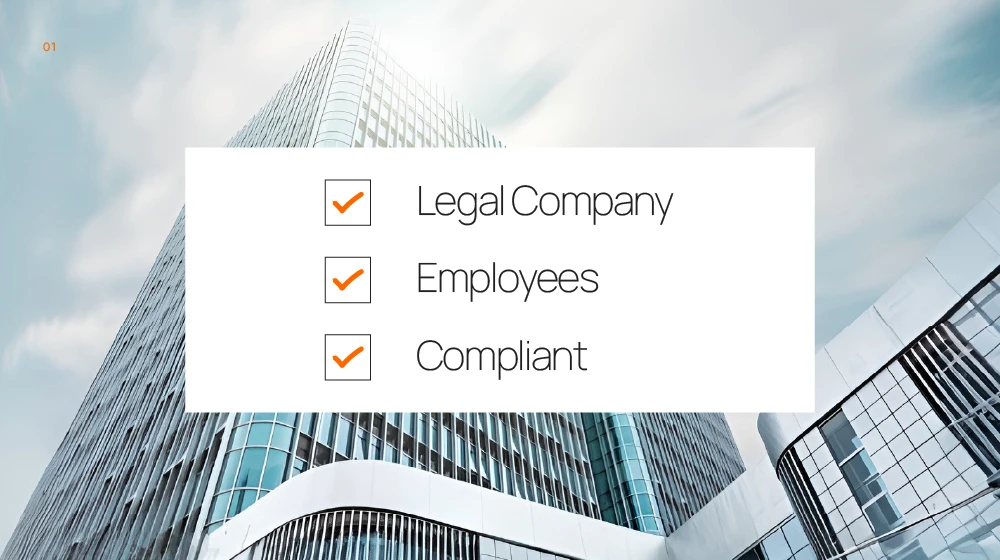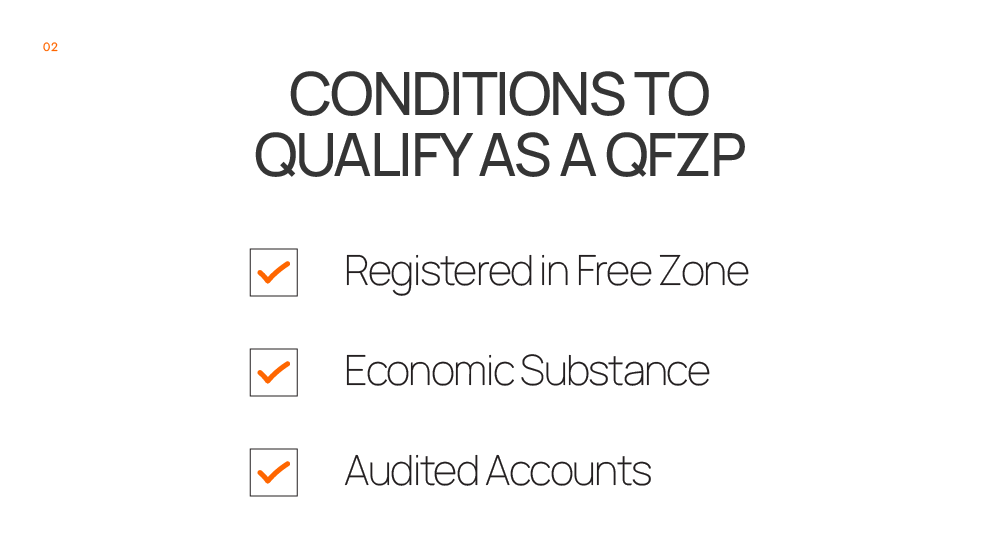The introduction of UAE corporate tax in 2023 brought significant changes for businesses operating in Free Zones. As 2025 approaches, companies need to understand the updated eligibility requirements for being recognized as a Qualifying Free Zone Person (QFZP) to ensure they can continue enjoying the benefits offered under this framework.
This blog is a detailed guide for business owners and decision-makers seeking clarity on what it takes to qualify as a qualifying free zone person in 2025. We will explore what QFZP status means, why it is important, and the key conditions that businesses must meet to maintain or obtain this classification. You will also learn about the types of income that qualify for the 0% corporate tax rate, geographic and activity restrictions for Free Zone operations, and the compliance obligations necessary to retain QFZP status.
Table of Contents
What Is Qualifying Free Zone Person in UAE?

Understanding exactly what is qualifying free zone person in UAE is the first step for any business operating in a Free Zone. A qualifying free zone person refers to a company, branch, or juridical entity that is incorporated, registered, or established in a UAE Free Zone and meets specific requirements set out by the UAE Corporate Tax Law. This status allows eligible businesses to benefit from a 0% corporate tax rate on qualifying income, provided all conditions are satisfied.
In simple terms, being a qualifying free zone person means your business operates within a designated Free Zone, conducts permitted activities, and adheres to compliance and substance rules. This status is not automatically granted. Businesses must demonstrate that they genuinely conduct economic activities within the Free Zone and meet other criteria that the UAE authorities require.
Key Points About Qualifying Free Zone Person
Legal Incorporation or Registration
A qualifying free zone person must be legally incorporated or registered in a recognized Free Zone. Only businesses established in designated Free Zones qualify for this status. For more details on which zones apply, check out our list of Free Zones in Dubai.
.
Economic Substance and Core Activities
To maintain QFZP status, a company must perform its core income-generating activities (CIGAs) within the Free Zone. This includes having sufficient qualified employees, assets, and expenditures in the zone. Outsourcing is allowed if activities are managed and supervised within the Free Zone.
Compliance With UAE Corporate Tax
A qualifying free zone person must comply with reporting requirements, including maintaining audited financial statements, observing transfer pricing rules, and ensuring that non-qualifying income does not exceed prescribed thresholds.
Benefits of Being a QFZP
Businesses recognized as a qualifying free zone person enjoy significant tax efficiency, primarily a 0% corporate tax rate on qualifying income. This can substantially improve cash flow and reinvestment capacity while aligning with UAE tax laws.
Restrictions and Conditions
Even if a business is located in a Free Zone, failing to meet substance requirements, income thresholds, or compliance obligations can result in loss of QFZP status. The UAE authorities take these requirements seriously to ensure that Free Zone benefits are used appropriately.
Why QFZP Status Matters in 2025
For businesses operating in UAE Free Zones, understanding why QFZP status is important in 2025 is essential. The UAE corporate tax regime has introduced significant changes that affect all Free Zone companies, and being recognized as a qualifying free zone person can have a direct impact on your business’s tax obligations and financial planning.
Maintaining QFZP status ensures that a business continues to benefit from a 0% corporate tax rate on qualifying income. This not only reduces the overall tax burden but also allows companies to reinvest savings into growth and operational efficiency. Beyond tax savings, achieving and retaining QFZP status demonstrates compliance with UAE regulations, which can enhance credibility with clients, investors, and banking partners.
0% Corporate Tax on Qualifying Income
The primary benefit of being a qualifying free zone person is the exemption from corporate tax on income that meets the qualifying income requirements. Businesses that fail to meet the criteria will be subject to the standard UAE corporate tax rate of 9%.
Business Credibility and Investor Confidence
QFZP status signals that a company is compliant with UAE laws and operates legitimately within a Free Zone. This status can boost investor confidence and provide assurance to business partners that the company follows proper regulatory practices.
Cash Flow and Financial Planning Advantages
With the 0% corporate tax benefit, companies can maintain stronger cash flow and allocate funds to reinvestment, expansion, or operational needs. This tax efficiency can provide a tangible competitive advantage in highly competitive markets.
Long-Term Compliance Benefits
Retaining QFZP status requires adherence to economic substance, reporting, and accounting requirements. Meeting these obligations proactively can reduce the risk of penalties or disqualification and ensure continuity of the tax benefit over multiple periods.
Strategic Positioning Within Free Zones
Free Zone authorities often provide additional benefits, such as access to infrastructure, networking, and licensing advantages. Being recognized as a qualifying free zone person positions your business to fully leverage these Free Zone incentives while staying compliant with corporate tax regulations.
The combination of tax efficiency, operational credibility, and strategic advantages makes QFZP status a central consideration for any Free Zone company navigating the UAE corporate tax framework.
Conditions to Qualify as a QFZP

To be recognized as a qualifying free zone person in 2025, a business must meet several specific conditions outlined under the UAE Corporate Tax Law. These conditions are designed to ensure that Free Zone entities are genuinely conducting economic activities within the zone and maintaining compliance with regulatory requirements. Failing to meet any one of these conditions can result in the loss of QFZP status and the associated 0% corporate tax benefit.
Understanding these conditions is critical for businesses seeking to maintain eligibility and plan their operations strategically.
1. Incorporation or Registration in a Recognized Free Zone
The business must be legally incorporated, established, or registered in a UAE Free Zone recognized for QFZP purposes. Only companies operating in these designated zones are eligible for the benefits.
Choosing the right company type between LLC and Free zone is crucial for any qualifying free zone person, which is why we recommend reading this article so you don’t make costly mistakes when qualifying as a QFZP.
2. Core Income-Generating Activities (CIGAs)
The company must perform its core activities within the Free Zone and demonstrate adequate economic substance. This includes:
- Maintaining sufficient qualified employees in the Free Zone
- Allocating appropriate assets for the business activities
- Ensuring operating expenditures support the core activities
3. Compliance with Transfer Pricing and Arm’s Length Principles
All related-party transactions must comply with UAE transfer pricing rules. Proper documentation, such as local files and master files, is required to prove that transactions are conducted at arm’s length.
4. Preparation of Audited Financial Statements
A qualifying free zone person must prepare audited financial statements, even if the revenue is below a certain threshold. This ensures transparency and supports verification of qualifying income.
5. Non-Qualifying Income Threshold (De Minimis Rule)
Non-qualifying income must not exceed prescribed limits, generally 5% of total revenue or AED 5 million, whichever is lower. Exceeding these thresholds can disqualify a business from QFZP status.
6. No Election to Be Taxed as a Mainland Entity
To retain QFZP benefits, a company cannot elect to be taxed under the standard UAE corporate tax regime applicable to mainland entities. Such an election results in the immediate loss of 0% corporate tax benefits for the tax period and subsequent periods.
7. Other Ministerial or Cabinet-Prescribed Conditions
The UAE authorities may require additional conditions or documentation as prescribed by law. Businesses should regularly review updates to ensure ongoing compliance.
What Is Qualifying Income In UAE Corporate Tax
A crucial aspect of being a qualifying free zone person is understanding which types of income are eligible for the 0% corporate tax rate. Not all revenue earned by a Free Zone company automatically qualifies. This makes it essential to clearly understand what is qualifying income in UAE corporate tax and how it is calculated.
For 2025, the UAE corporate tax framework defines qualifying income corporate tax UAE as income derived from activities that meet specific criteria within the Free Zone. Only this income is eligible for the 0% rate, while other non-qualifying revenue may be taxed at the standard corporate tax rate. Businesses that exceed the allowable threshold of non-qualifying income risk losing QFZP status altogether.
Types of Qualifying Income
Income from Free Zone Transactions
Revenue generated from transactions with other Free Zone persons may qualify if the income meets the prescribed conditions. This includes business-to-business services, trading activities, and other commercial operations conducted entirely within recognized Free Zones.
Income from Intellectual Property and Licensing
Businesses earning revenue from qualifying intellectual property (IP), such as patents, trademarks, or software licenses, may count this as qualifying income corporate tax UAE, provided the IP is actively exploited within the Free Zone and meets economic substance requirements.
Other Qualifying Business Activities
Certain commercial activities performed within the Free Zone, including consulting, IT services, or logistics support, may also be recognized as qualifying income. Businesses must document and justify these activities to ensure compliance.
Limits on Non-Qualifying Income
Non-qualifying income includes revenue derived from outside the permitted activities or outside the Free Zone. This income must remain below the de minimis threshold (generally 5% of total revenue or AED 5 million, whichever is lower). Exceeding these limits can jeopardize QFZP status.
Compliance and Documentation Requirements
To claim income as qualifying, a qualifying free zone person must maintain accurate financial records, demonstrate substance within the Free Zone, and provide evidence for all transactions. Audited financial statements play a key role in verifying qualifying income.
Business Activities and Geographic Restrictions

Holding qualifying free zone person status comes with clear limits on what activities you can perform and where you can conduct them. The UAE corporate tax regime ensures these benefits are tied to genuine Free Zone operations, so crossing into prohibited areas can quickly lead to losing QFZP eligibility.
Key Rules to Follow
1. Permitted Activities
Qualifying activities generally include manufacturing, logistics, trading between Free Zone entities, professional services, holding company functions, and certain intellectual property uses.
2. Restricted Activities
Retail sales to mainland consumers, mainland real estate transactions, and some financial services usually fall outside the qualifying scope unless specifically approved.
3. Mainland Dealings
You can work with mainland businesses, but most income from these transactions is non-qualifying unless exempt (such as the transit of goods through the mainland without entering its market). Here’s an article where we explain if a mainland company can do business in freezone , and this is important for you if you want to be eligible for qualifying free zone person.
4. International Operations
Global trade is allowed, provided it meets qualifying income requirements and economic substance rules. Many Free Zone companies use this advantage to position themselves as regional hubs.
5. Location-Based Requirements
Operations must be primarily managed and controlled from within the Free Zone. Outsourcing is acceptable, but core decision-making should stay within the zone.
Staying within these activity and location boundaries ensures a qualifying free zone person keeps access to the 0% corporate tax rate without risking compliance issues.
Accounting, Reporting, and Compliance Obligations

To maintain qualifying free zone person status in 2025, meeting the eligibility criteria is only part of the job. Equally important is following the accounting, reporting, and compliance rules set by the UAE Ministry of Finance and the Federal Tax Authority. These obligations ensure transparency, verify qualifying income, and prove that the entity is operating legitimately within a Free Zone.
Core Compliance Requirements for a Qualifying Free Zone Person
Audited Financial Statements
Every qualifying free zone person must prepare and submit audited financial statements, regardless of turnover size. These reports confirm revenue, expenses, and the proportion of qualifying and non-qualifying income.
Accurate Recordkeeping
Books must clearly distinguish between qualifying and non-qualifying transactions. This separation helps avoid disputes with tax authorities and protects your eligibility.
Economic Substance Reporting
A qualifying free zone person must demonstrate adequate substance within the Free Zone, meaning qualified staff, relevant assets, and expenses that match business activity. This report is submitted annually to prove genuine operations.
To maintain qualifying free zone person status, ensuring your staff and operations meet Free Zone visa requirements is essential, as explained in our recent blog.
Transfer Pricing Compliance
If your Free Zone company engages in related-party transactions, you must comply with UAE transfer pricing regulations. Maintaining proper documentation ensures these dealings meet the arm’s length standard.
Annual Corporate Tax Return
Even if most or all of your revenue is qualifying income, a corporate tax return must be filed each year to the Federal Tax Authority, confirming your qualifying free zone person status.
Timely Submissions and Renewals
Missing deadlines for reports, filings, or license renewals can lead to penalties and loss of QFZP benefits. Maintaining a compliance calendar is essential.
Responding to Tax Authority Queries
The FTA may request clarifications or additional documentation to verify your claims. A qualifying free zone person should be ready with organized, up-to-date records to avoid delays or disputes.
Common Mistakes and How to Avoid Losing QFZP Status
Many businesses work hard to obtain qualifying free zone person status, only to lose it because of avoidable errors. The rules are strict, and even small oversights can mean losing access to the 0% corporate tax rate. Knowing the most common mistakes will help a qualifying free zone person stay on the right side of compliance.
Frequent Pitfalls for a Qualifying Free Zone Person
Earning Too Much Non-Qualifying Income
A qualifying free zone person must ensure that non-qualifying income stays below the allowed threshold. Exceeding this limit even once can result in losing QFZP status for the entire tax period.
Incorrectly Categorizing Income
Mislabeling revenue as qualifying income when it does not meet the definition can lead to penalties. A qualifying free zone person must be certain that income classification matches UAE corporate tax rules.
Failing to Maintain Economic Substance
Without the required staff, premises, and operational expenses within the Free Zone, a qualifying free zone person risks being disqualified during audits or reviews.
Non-Compliance with Reporting Deadlines
Missing tax return submissions or failing to provide audited statements on time can cost a qualifying free zone person their eligibility.
Engaging in Prohibited Activities
Carrying out restricted business activities, especially those tied to the UAE mainland, without exemptions, can lead to immediate loss of qualifying free zone person status.
Poor Documentation
Inadequate recordkeeping makes it hard for a qualifying free zone person to prove compliance when challenged by the Federal Tax Authority.
Ignoring Changes in Regulations
A qualifying free zone person must stay updated on evolving tax rules. Operating under outdated assumptions is a common cause of status loss.
How to Avoid These Issues
- Regularly review income sources and confirm they align with the qualifying income definition.
- Keep comprehensive, organized records that separate qualifying and non-qualifying transactions.
- Conduct internal compliance audits at least once a year.
- Seek professional advice when planning new business activities or entering unfamiliar markets.
- Monitor government updates to ensure the business is following the most current requirements for a qualifying free zone person.
Avoiding these mistakes not only preserves qualifying free zone person status but also ensures the business continues benefiting from tax incentives without interruption.
But there are 8 must-know challenges most businesses face in the UAE, and we explain how to avoid them to make sure you don’t lose the qualifying free zone person status.
Steps to Determine If Your Business Qualifies
To confirm your status as a qualifying free zone person, follow a structured review process.
Check Your Business Activity
Verify that your core operations fall under the list of qualifying activities.
Assess Income Sources
Ensure the majority of your revenue meets the definition of qualifying income under UAE corporate tax rules.
Review Geographic Operations
Confirm that activities are primarily managed and controlled from within your Free Zone.
Evaluate Economic Substance
Check that you have sufficient staff, assets, and operational expenses in the Free Zone.
Confirm Compliance History
Ensure tax filings, audited statements, and reporting obligations are up to date.
Seek Professional Review
Have a corporate tax specialist validate your eligibility and advise on any risks to your qualifying free zone person status.
Ensuring Long-Term QFZP Compliance and Benefits

Maintaining qualifying free zone person status in 2025 is not just about meeting the initial criteria, it’s about continuous compliance, accurate income classification, and strict adherence to activity and location rules. The benefits, particularly the 0% corporate tax rate, make this status worth protecting.
At GCG Structuring, we guide you through the entire process of company formation in a UAE Free Zone. From selecting the right Free Zone and company type to defining core activities, establishing economic substance, and ensuring your income qualifies for 0% corporate tax, we provide a complete roadmap.
Our team handles the complex regulatory and compliance requirements, including licensing, corporate tax filings, audited financials, and transfer pricing documentation, so you can focus on growing your business.
FAQ
1. 0 Can a Free Zone company lose QFZP status if it expands internationally?
Yes, but only if core activities are no longer managed or controlled from within the Free Zone. Proper structuring keeps international growth compliant.
2. 0 Does all income earned in a Free Zone automatically qualify for 0% tax?
No. Only income that meets the UAE corporate tax definition of qualifying income counts. Non-qualifying revenue must stay below set thresholds.
3. 0 What happens if a company misses its reporting deadlines?
Missing filings or audit submissions can result in losing qualifying free zone person status and the associated 0% corporate tax benefit.





